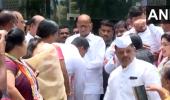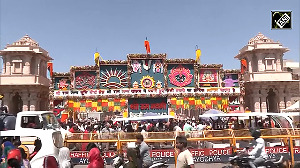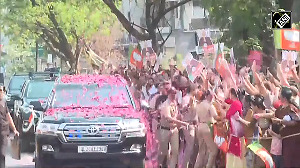Public sentiments turned sharply against the Bharatiya Janata Party following its alliance with the Ajit Pawar-led Nationalist Congress Party that subsequently led to bad performance of the saffron party in the Lok Sabha polls in Maharashtra, a report published by a Marathi weekly linked to the Rashtriya Swayamsevak Sangh said.

The weekly publication, Vivek, affiliated with the RSS, conducted an informal survey involving more than 200 individuals from Mumbai, Konkan, and western Maharashtra to analyse the reasons behind the BJP's electoral setback in the crucial state, which sends the second highest number of MPs to the Lok Sabha at 48.
The report said BJP members and other individuals expressed disapproval of the party's decision to join forces with the Nationalist Congress Party, which became an ally in the Shiv Sena-BJP government in the state in July 2023.
Describing the unrest among party members as just the "tip of the iceberg," the report shed light on the underlying discontent within the BJP.
The BJP's seat count in Maharashtra dropped drastically from 23 in 2019 to just nine in the recent Lok Sabha polls, with its ally Shiv Sena led by Chief Minister Eknath Shinde securing seven seats and the NCP, led by deputy CM Ajit Pawar, managing to win in just one constituency.
In contrast, the Opposition Maha Vikas Aghadi, comprising the Shiv Sena-Uddhav Balasaheb Thackeray, NCP-Sharadchandra Pawar, and the Congress, put up an impressive show and collectively won 30 out of the 48 seats.
The report highlighted the disapproval among BJP members and sympathisers regarding the alliance with the NCPand pointed out the perceived departure from the party's core values.
"Almost every person who is either in the BJP or affiliated to organisations (Sangh Parivar) cited that he does not approve of the BJP allying with the NCP (led by Ajit Pawar).
"Before writing this piece, we interacted with more than 200 industrialists, traders, doctors, professors and teachers. The unrest among the party cadre because the BJP allied with the NCP is the tip of the iceberg," it observed.
The report also raised concerns about the national party's future strategies in light of the adverse political dynamics resulting from the alliance.
The BJP's alliance with the Shiv Sena in Maharashtra, long seen as a natural fit due to their shared Hindutva ideology, has faced challenges and criticism.
The alliance was tested when former MVA minister Eknath Shinde rebelled against then-Chief Minister Uddhav Thackeray, leading to the government's downfall in June 2022. Despite initial tensions, the BJP ultimately supported Shinde, who successfully formed a new government with BJP MLAs' backing, assuming the role of state chief minister.
However, the political landscape shifted a year later when opposition leader Ajit Pawar claimed the support of his party MLAs and workers, and joined the Shinde-led government as deputy chief minister, going against the wishes of his uncle and NCP founder Sharad Pawar.
This move was validated by favourable verdicts from both the Election Commission of India and the legislative assembly speaker.
Criticism mounted against the BJP when it formed alliances with the NCP, straying from its traditional partnerships and questions arose about the party's future direction as this move contradicted its previous strategies.
"However, the sentiments went totally against the party (BJP) after it joined hands with the NCP. The question also arises about the future plans of the party when political arithmetic went against it because of the NCP," the report in the Marathi weekly noted.
The article highlighted concerns about the BJP's tendency to induct leaders from other parties, bypassing the traditional process of grooming talent within the organisation.
Past stalwarts like Atal Bihari Vajpayee, Gopinath Munde, Pramod Mahajan, and current leaders such as Nitin Gadkari, and Devendra Fadnavis were cited as examples of politicians who rose through the ranks from humble party workers, a tradition seemingly neglected in recent times.
Moreover, the report emphasised the significance of internal party coordination and the empowerment of party workers in decision-making processes, citing these factors as key contributors to the BJP's success in Madhya Pradesh, where the party secured all 29 Lok Sabha seats.
The weekly also underscored the limited acceptance of the Ram temple and the sacrifice of the RSS and BJP workers during the 1975-77 Emergency.
"There is no doubt about the sacrifice of party workers during the Emergency period as well as for the Ram temple movement. How much does it resonate with educated people under the age of 45 when it comes to voting? Even if the person is pro-Hindutva, he would not feel any connection with the incidents that took place three to four decades back," the article said.
After the Lok Sabha polls results were declared on June 4, RSS-linked magazine 'Organiser' had said the polls outcome came as a "reality check for overconfident" BJP workers and many of its leaders as they were happy in their "bubble" and enjoying the glow of Prime Minister Narendra Modi's aura but not listening to the voices on the streets.
The article in the 'Organiser' has cautioned the BJP against complacency and emphasised the importance of grassroots engagement, noting a disconnect between party leaders and the public sentiment on the ground.











 © 2025
© 2025